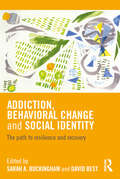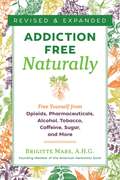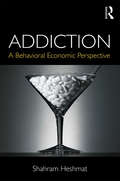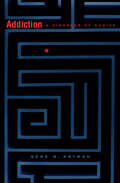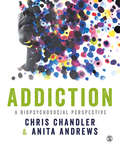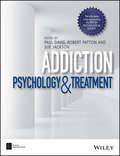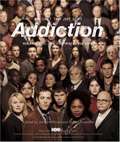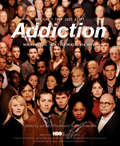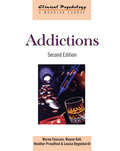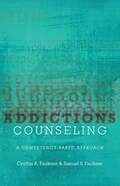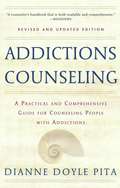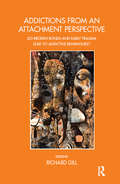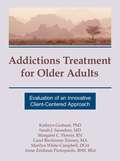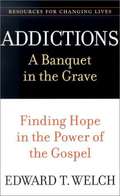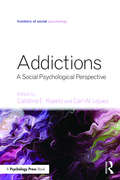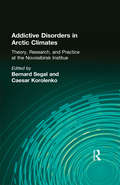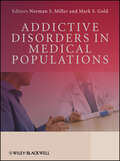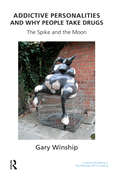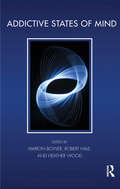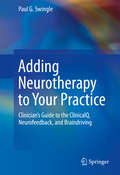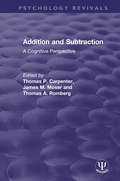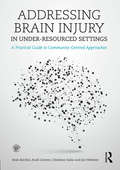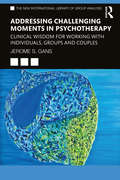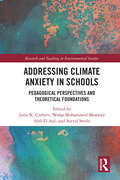- Table View
- List View
Addiction, Behavioral Change and Social Identity: The path to resilience and recovery
by Sarah A. Buckingham and David BestChanging health-related behavior is for many people a lonely and isolating experience. Individual willpower is often not enough, particularly in addressing addictive behavior, but research increasingly points to the potential of group identity to shape behavior change and support recovery. This important collection explores the social and cognitive processes that enable people who join recovery groups to address their addictive issues. In an era of increasing concern at the long-term costs of chronic ill-health, the potential to leverage group identity to inspire resilience and recovery offers a timely and practical response. The book examines the theoretical foundations to a social identity approach in addressing behavior change across a range of contexts, including alcohol addiction, obesity and crime, while also examining topics such as the use of online forums to foster recovery. It will be essential reading for students, researchers and policy makers across health psychology and social care, as well as anyone interested in behavioral change and addiction recovery.
Addiction-Free Naturally: Free Yourself from Opioids, Pharmaceuticals, Alcohol, Tobacco, Caffeine, Sugar, and More
by Brigitte MarsA guide to designing a personal program to break your addictions safely, gently, and naturally • Shares herbs, supplements, natural remedies, and alternative practices that can help liberate you from habitual substance use, ease the withdrawal period, cleanse the body of toxins, and combat depression, anxiety, fatigue, and stress • Offers specific advice and remedies for individual addictive substances and behaviors, including sugar, caffeine, alcohol, opioids, tobacco, and tranquilizers • Explores the potential of psychedelic therapy for overcoming addiction and addresses how cannabis can be of benefit for recovery, without being misused Addiction affects more people than any other disease. Breaking a habit can be daunting--it&’s hard to know where to begin beyond quitting &“cold turkey.&” But just as habits can be acquired, they can be broken. Others have done it, and so can you! In this holistic guide to beating addiction, Brigitte Mars details how to replace negative habits and behaviors with positive healthy ones and safely support your body, mind, and spirit for a successful recovery. The author shares specific herbs, supplements, homeopathic remedies, flower essences, behavioral therapy, and alternative practices, such as meditation and yoga, that can help liberate you from habitual substance use and ease the withdrawal period as well as methods for cleansing the body of toxins and healthy ways to combat depression, anxiety, fatigue, and stress. She looks in depth at individual addictive substances and behaviors, including sugar, caffeine, alcohol, opioids, tobacco, and tranquilizers, offering specific advice and remedies for each. She shows how each technique can be used in conjunction with conventional therapies, such as psychotherapy, methadone, or Alcoholics Anonymous. Drawing on recent research, she also explores the enormous potential of psychedelic therapy for overcoming addiction and, with the spreading legalization of cannabis, she addresses how this plant can be of benefit for recovery, without being misused. Offering advice on designing a personal program to break your addictions, the author also shows how to use natural remedies to maintain your new energy and vitality as you walk the road to recovery.
Addiction: A Behavioral Economic Perspective
by Shahram HeshmatAddiction: A Behavioral Economic Perspective focuses on the behavioral economics of addiction to explain why someone decides and act against her own well-being. It answers the questions of what accounts for self-defeating behavior patterns and how do we best motivate individuals to act according with their long-term goals. A better understanding of decision processes will lead to an improved knowledge of why people engage in self-destructive behaviors and better policy interventions in areas of addiction and obesity. The approach also promises to be valuable as a framework for understanding decisions for an addict’s professional and business life. This book will be of particular use to clinicians, students, and researchers in the fields of addiction, public health, and behavior therapy.
Addiction: A Disorder of Choice
by Gene M. HeymanIn a book sure to inspire controversy, Gene Heyman argues that conventional wisdom about addiction—that it is a disease, a compulsion beyond conscious control—is wrong. Drawing on psychiatric epidemiology, addicts’ autobiographies, treatment studies, and advances in behavioral economics, Heyman makes a powerful case that addiction is voluntary. He shows that drug use, like all choices, is influenced by preferences and goals. But just as there are successful dieters, there are successful ex-addicts. In fact, addiction is the psychiatric disorder with the highest rate of recovery. But what ends an addiction? At the heart of Heyman’s analysis is a startling view of choice and motivation that applies to all choices, not just the choice to use drugs. The conditions that promote quitting a drug addiction include new information, cultural values, and, of course, the costs and benefits of further drug use. Most of us avoid becoming drug dependent, not because we are especially rational, but because we loathe the idea of being an addict. Heyman’s analysis of well-established but frequently ignored research leads to unexpected insights into how we make choices—from obesity to McMansionization—all rooted in our deep-seated tendency to consume too much of whatever we like best. As wealth increases and technology advances, the dilemma posed by addictive drugs spreads to new products. However, this remarkable and radical book points to a solution. If drug addicts typically beat addiction, then non-addicts can learn to control their natural tendency to take too much.
Addiction: A biopsychosocial perspective
by Dr Chris Chandler Ms Anita AndrewsAddiction: A biopsychosocial perspective provides students with an evidence-based approach to addiction whilst covering a broad range of topics, critical perspectives and influential theories in addiction. With chapters discussing key theories, psychological, biological and societal aspects of addiction, this is a highly accessible and essential resource for students and researchers that: Offers an evidence-based discussion of addiction Addresses the neuroscience and psychology of addiction Provides a critical account of the science and research in addiction Includes chapter overviews and summaries, learning aims and case studies to help students in their study
Addiction: A biopsychosocial perspective
by Dr Chris Chandler Ms Anita AndrewsAddiction: A biopsychosocial perspective provides students with an evidence-based approach to addiction whilst covering a broad range of topics, critical perspectives and influential theories in addiction. With chapters discussing key theories, psychological, biological and societal aspects of addiction, this is a highly accessible and essential resource for students and researchers that: Offers an evidence-based discussion of addiction Addresses the neuroscience and psychology of addiction Provides a critical account of the science and research in addiction Includes chapter overviews and summaries, learning aims and case studies to help students in their study
Addiction: Psychology and Treatment
by Paul Davis Sue Jackson Robert PattonAddiction: Psychology and Treatment brings together leading psychologists to provide a comprehensive overview of the psychology of addictions and their treatment across specialities and types of services. Emphasises the use of several approaches including CBT, psychodynamic and systemic and family treatments, and consideration of the wider picture of addictions As well as the theories, gives a clear overview of the application of these models Reflects the very latest developments in the role played by psychological perspectives and interventions in the recovery agenda for problem drug and alcohol users
Addiction: Why Can't They Just Stop ?
by David Sheff Katherine Ketcham Larkin Warren Katherine Eban Susan Froemke John HoffmanThis companion book to the HBO documentary of the same name sheds light on the hidden American epidemic of addiction and offers a comprehensive and provocative look at the impact of chemical dependency on addicts, their loved ones, society, and the economy.
Addiction: Why Can't They Just Stop?
by Susan Cheever Susan Froemke John Hoffman Sheila NevinsThis companion book to the HBO documentary of the same name sheds light on the hidden American epidemic of addiction. Blending compelling personal narratives with statistics and expert opinion, all gleaned from over two years of research and reporting, ADDICTION offers a comprehensive and provocative look at the impact of chemical dependency on addicts, their loved ones, society, and the economy. Breaking the stigma that addicts are simply weak and immoral, it delves into new brain research proving that drugs and alcohol change the chemical composition of addicts' brains, making it veritably impossible for them to quit. The nation's top experts persuasively argue that the time has come for the blame to stop and the healing to begin.ADDICTION also features material not included in the documentary: testimonials, original graphics and images, additional elaboration on theories and treatments of addiction, and more. Featuring a foreword by Sheila Nevins, the president of Documentary and Family Programming at HBO, an afterward by the best-selling author Susan Cheever, and the writing of David Sheff, this book is essential reading for anyone who has been impacted by what is now realized to be a very real and widespread disease.
Addictions (Clinical Psychology: A Modular Course)
by Wayne Hall Maree Teesson Heather Proudfoot Louisa DegenhardtThe first edition of Addictions established itself as a valuable resource for students and professionals alike. This authoritative new edition builds on the success of the previous book, incorporating advances in research and practice over the last ten years. The book includes material on: the nature of addiction and who becomes addicted health consequences of alcohol and other drug dependence theories and causes of addiction. The authors, experts in the field, also include new material on the controversy surrounding the possible positive effects of alcohol and cannabis use, the increased risk of interpersonal violence, and new research on theories of addiction. Addictions will be essential reading for students, professionals and researchers seeking state of the art information about this rapidly growing field.
Addictions Counseling: A Competency-based Approach
by Cynthia A. Faulkner Samuel FaulknerWritten by authors with extensive experience as practitioners and educators, this text serves as a straightforward resource for undergraduate and graduate students who have a goal of becoming counselors or therapists in the field of addiction. <p><p>While many books on the subject follow a similar format (i.e., introduction, classification of drugs, theories of counseling, etc.), Addictions Counseling takes one client and follows her through the entire treatment experience-from referral and assessment, all the way through relapse prevention and discharge planning. In following her through the treatment journey, readers are introduced to theories and techniques for approaching each of the topics discussed. This book is a must-read for anybody interested in pursuing a career as an addiction specialist.
Addictions Counseling: A Practical and Comprehensive Guide for Counseling People with Addictions
by Dianne Doyle PitaThis wholly revised and updated edition of Addictions Counseling is widely read by professional counselors as well as ministers, teachers, and nurses. Topics include the counselor's role in recovery, treatment approaches, and sample treatment plans.
Addictions From an Attachment Perspective: Do Broken Bonds and Early Trauma Lead to Addictive Behaviours? (The Bowlby Centre Monograph Series)
by Richard GillThis outstanding book is an important collection of papers from the 2013 John Bowlby Memorial Conference by accomplished clinicians from different modalities who share their experience of working with people with different kinds of addiction. The papers bring together an in-depth understanding that addictions are a response to, and hold the pain of, broken attachments and are best treated within healthy interpersonal relationships. For a long time the person with an addiction has been seen as the problem with society being able to live in denial of the causes. These papers open up innovative and effective ways of working with people troubled by addiction from an attachment-informed perspective. Contributors: Cara Crossan, Richard Gill, Lynn Greenwood, Bob Johnson, Liz Karter, Edward Khantzian, Arlene Vetere, Kate White, Jason Wright
Addictions Treatment for Older Adults: Evaluation of an Innovative Client-Centered Approach
by Kathryn Graham Sarah J Saunders Margaret C Flower Carol B Timney Marilyn White-Campbell Anne ZeidmanHere is a detailed description of an innovative approach for treating elderly persons who have alcohol or drug problems. During the past few years there has been growing recognition of the special needs of these individuals. Addictions Treatment for Older Adults describes the evaluation of the Community Older Persons Alcohol (COPA) Program. This book helps readers understand the nature of substance abuse among the elderly, as well as how to identify and intervene with older persons who have alcohol and drug problems, including persons who are reluctant to seek treatment. Addictions Treatment for Older Adults explains the development of the COPA program and how it works. Many case studies and tables provide illuminating details for readers who work with this elderly population. Chapters examine characteristics of elderly persons with alcohol or drug problems the typology of COPA clients and their problem areas treatment interventions variables associated with improvement analysis of progress made by clients during and after treatment the factors that seem to predict recoveryThe in-depth descriptions in this book provide much needed information and guidance for professionals striving to meet the treatment and care needs of elderly substance abusers. Addictions Treatment for Older Adults should be read by researchers in the substance abuse field and by persons who work with the elderly, such as community nurses, social workers, and physicians. In this book they will find the best description to date of the nature of alcohol and drug problems among elderly who live in their communities.
Addictions: A Banquet in the Grave, Finding Hope in the Power of the Gospel
by Edward T. WelchThis book on addictions offers a profoundly biblical analysis of addictive behavior and helps readers face their own addictions.
Addictions: A Social Psychological Perspective (Frontiers of Social Psychology)
by Catalina E. Kopetz Carl W. LejuezThe current volume brings together social psychological theories and concepts and discusses their relevance to understanding substance use and addiction. It identifies convergence points between traditional perspectives on addiction and social psychological theory and research. This coexistence, which acknowledges the value of the conceptual and methodological advancements in each relevant field and attempts to integrate them, promotes scientific understanding and a more effective prevention and treatment of addiction.
Addictive Disorders in Arctic Climates: Theory, Research, and Practice at the Novosibirsk Institute
by Bernard SegalDiscover fresh perspectives on alcoholism treatment and research with this enlightening new book describing the work of researchers at the Novosibirsk Medical Institute, USSR. By using specific examples of their studies in Siberia, the reserachers offer an innovative approach to the treatment of addictive disorders in general. Instead of focusing on the drinking behavior itself, the treatment focuses on the relation of the problem to the interaction of economic, social, and psychological factors. To address the question of whether alcoholics should all be treated in the same way, or if alcholism treatment should be more individualized in approach, chapters are devoted to the differences between alcoholism in women, adolescents, and alchoholics who are afflicted with “rapid development of alcholism syndrome.” The research examples in Addictive Disorders in Arctic Climates benefits professionals involved in the treatment of alcholism by introducing new perspectives and broadening contemporary research.
Addictive Disorders in Medical Populations
by Mark S. Gold Norman S. MillerThis book has a much wider focus than traditional books written about drug and alcohol addictions. This unique book is written by medical specialists who diagnose, treat and research addictive disorders in their specialities. Thus, it meets the needs of the typical medical practitioner who wants to learn about and treat patients with addictive disorders in their practices. Because alcohol and drug problems are so prevalent and affect medical conditions profoundly, the medical specialist will improve their knowledge and skill to diagnose and treat addictive disorders in their specialties.Drug and alcohol addictions occur commonly in medical populations; 25-50% of patients seen by primary care physicians have alcohol and drug disorders, with even higher prevalence in certain medical specialty populations. Drug use (including illicit drug use and actual or perceived misuse of prescribed medications), alcohol use, and what has been called unhealthy drinking are even more common in trauma centers and our society. Currently, there are no authoritative addiction texts that focus on the identification, intervention and management of either "addictive disorders in medical populations" or "medical complications in addiction populations".Neurobiological progress in the field of addiction has been amazing and evidence-based treatments have developed at a phenomenal pace, with bench to office applications for tobacco, alcohol and drugs. Pharmacological and psychosocial treatments are described here in detail and in practical terms. The medical and mental complications of addiction are explained comprehensively throughout the text. Clinical considerations are the predominant theme, with the standards of clinical practice grounded in the most current research. The chapters include practical presentations of both clinical and research materials, with instruments for screening and assessment and treatment.It will be useful for all those seeking information to help a patient or family with a tobacco, alcohol or drug problem. We hope this book can give answers and direction to the identification and management of addictions and their medical complications in patient populations.
Addictive Personalities and Why People Take Drugs: The Spike and the Moon (The\united Kingdom Council For Psychotherapy Ser.)
by Gary Winship'Why do we take drugs? I haven't the faintest idea, but Gary Winship has a damned good go at telling me the answer. Some might say this is a largely academic book, but as an ex-psychiatric nurse and a Jo Public for the last twenty-five years, I'd say there's something in here for everyone. We've all taken drugs at some point in our lives (except, perhaps, my grandma) so one way to find out why is by reading this fascinating book.'- Jo Brand, comic, author, and actress
Addictive States of Mind (Tavistock Clinic Series)
by Rob Hale Heather Wood Marion BowerThis chapter, written by a psychiatrist working with people with severe and complex addictions, sets the scene. We are provided with a graphic account of the multiple problems—physical, psychological, social, financial—of someone with severe drug addiction, where sex working and the risks of pregnancy, infection, and assault compound an already challenging presentation. The personal history of trauma and abuse means that the patient requires highly skilled and sensitive management, and adaptations in service provision—such as no morning appointments—that respect the individual’s lifestyle. The conflict for professionals is encapsulated in a brief description of the responses of Vanessa Crawford’s patient group when asked what messages they would like to be conveyed to future doctors: don’t prejudge us, treat us as individuals, give us proper pain control—and “don’t trust us”. Implicit in this is the recognition that they are in the grip of something that leads them to deceive, probably themselves, but also others—a wish to pervert a relationship to someone who is trying to help. Crawford conveys the importance of being knowledgeable, but not omniscient; of helping the individual to overcome the barrier of shame, which may lead to information being withheld; and the crucial contribution of a collaborative and coherent staff team in containing such challenging patients and in helping them to turn a corner towards recovery.
Adding Neurotherapy to Your Practice: Clinician’s Guide to the ClinicalQ, Neurofeedback, and Braindriving
by Paul G. SwingleThis clinical manual argues for using neurotherapy to enhance mental health and medical practice across settings and specialties. The text takes readers through the tools and methods of neurotherapy: the ClinicalQ for intake assessment, a stimulated EEG modality called braindriving, and neurofeedback protocols to retrain brain function. Case studies demonstrate neurotherapy as an efficient component in treating brain-related and mind/body conditions and symptoms, from ADHD, sleep disturbances, and depression to fibromyalgia and seizures. Its methods allow clinicians to find deviations in brain function that fall through the diagnostic cracks and choose therapeutic interventions best suited to clients based on reliable data. Included in the coverage: Treating the condition instead of the diagnosis. Case examples illustrating how to conduct the ClinicalQ, interpret results, and convey them to clients. Sample protocols of braindriving and neurofeedback. Using therapeutic harmonics to advance neurotherapy. Age-appropriate neurotherapy for children and seniors. Brainwave diagrams, data tables, client forms, and other helpful tools and visuals. Adding Neurotherapy to Your Practice will interest psychologists, physicians, psychiatrists, chiropractors, and social workers. This stimulating presentation emphasizes the individuality of every client, and the abundant healing capacity of the brain.
Addition and Subtraction: A Cognitive Perspective (Psychology Revivals)
by Thomas P. Carpenter; James M. Moser; Thomas A. RombergA hallmark of much of the research on children’s thinking in the 1970s had been the focus on explicit content domains. Much of this research had been represented by an eclectic collection of studies sampled from a variety of disciplines and content areas. However, in the few years before this publication, research in several content domains has begun to coalesce into a coherent body of knowledge. Originally published in 1982, the chapters in this work represent one of the first attempts to bring together the perspectives of a variety of different researchers investigating a specific, well defined content domain. This book presents theoretical views and research findings of a group of international scholars who are investigating the early acquisition of addition and subtraction skills by young children. Together, the contributors bring a blend of psychology, educational psychology, and mathematics education to this topic. Fields of interest such as information processing, artificial intelligence, early childhood, and classroom teaching and learning are included in this blend.
Addressing Brain Injury in Under-Resourced Settings: A Practical Guide to Community-Centred Approaches
by Rudi Coetzer Ross Balchin Christian Salas Janice WebsterMany of the world’s population have no access to appropriate diagnostic, neurorehabilitative or support services following brain injury. Addressing Brain Injury in Under-Resourced Settings: A Practical Guide to Community-Centred Approaches tackles this unacceptable gap in service provision by empowering the reader to provide basic care, education and support for patients with brain injuries and their families. Written for an audience which does not necessarily have any prior knowledge of the brain, neurorehabilitation or brain injuries/pathologies, this practical guide first examines the global context of brain injury, considering the cross-cultural realities across communities worldwide. The book goes on to explore the reality of brain injury and how to work with its consequences, offering practical knowledge and advice in a user-friendly, richly illustrated format. It provides easily digestible information about the brain, including its normal functioning and the ways in which it can be damaged through injury and disease. The book also covers the basic skills needed to identify neurological difficulties and provides guidance on basic rehabilitation input and support. The final section of the book covers how to provide services, including working with organisations and communities, volunteering, initiating and developing community-based projects and programmes, and caring for patients and their families from emergency to recovery to rehabilitation. This book is an invaluable resource for community health workers, voluntary sector workers and all professional healthcare providers who work with brain-injured patients around the world. It will also be important reading for policy developers, fundraising organisations and those who work with global humanitarian initiatives.
Addressing Challenging Moments in Psychotherapy: Clinical Wisdom for Working with Individuals, Groups and Couples (The New International Library of Group Analysis)
by Jerome S. GansThis practical and helpful volume details how clinicians can work through various common challenges in individual, couple, or group psychotherapy. Chapters draw upon clinical wisdom gleaned from the author’s 48 years as a practicing psychiatrist to address topics such as using countertransference for therapeutic purposes; resistance, especially when it needs to be the focus of the therapy; and a prioritization of exploration over explanation. Along with theory and clinical observations, Dr.Gans offers a series of "Clinical Pearls," pithy comments that highlight different interventions to a wide range of clinical challenges. These include patient hostility, the abrupt and unilateral termination of therapy, the therapist’s loss of compassionate neutrality when treating a couple, and many more. Many of the "Clinical Pearls" prioritize working in the here-and-now. In addition to offering advice and strategies for therapists, the book also addresses concerns like the matter of fees in private practice and the virtue of moral courage on the part of the therapist. Written with clarity, heart, and an abundance of clinical wisdom, Addressing Challenging Moments in Psychotherapy is essential reading for all clinicians, teachers, and supervisors of psychotherapy.
Addressing Climate Anxiety in Schools: Pedagogical Perspectives and Theoretical Foundations (Research and Teaching in Environmental Studies)
by Julie K. Corkett Astrid Steele Wafaa Mohammed Moawad Abd-El-AalThis monograph presents a contemporary examination of climate anxiety within schools. Featuring contributions from experts across Canada, Austria, Australia, New Zealand, the United Kingdom, Italy, and Finland, the book underscores the prevalence of climate anxiety, a phenomenon often overlooked in discussions about climate change and education. The monograph is divided into two sections. The first section begins by outlining how climate anxiety manifests in schools, examining the theoretical underpinnings of climate change education and its psychological impact on students and teachers. The second section presents innovative and practical strategies for mitigating climate anxiety in the classroom, highlighting the importance of cohesive learning environments and cross-curricular approaches. Readers will benefit from the book’s international perspective and its blend of theory and practice, gaining valuable insights into how to address climate anxiety and foster resilience in educational contexts.An international, empirical, and ethnographic evidence-based perspective of climate anxiety in classroom, this book will appeal to scholars, researchers, postgraduate students, and educators with interests in climate change education, sustainability education, policy and administration, mental health, and pedagogy.
